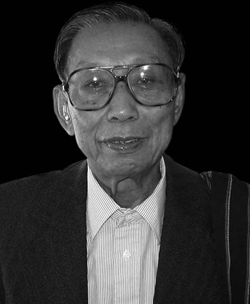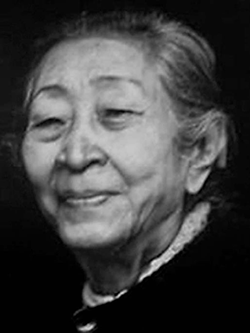
| MAY, 2008 - VOLUME 16 NO.5 |
BURMA’s independent media scene lost two of its most outstanding figures in April, when Kyemon U Thaung and Ludu Daw Amar died within four days of each other.
Kyemon U Thaung, chief editor of the Thailand-based Burmese language journal Khit Pyaing (New Era), died in hospital on April 3 in Fort Lauderdale, Florida, at the age of 82. Ludu Daw Amar, Burma’s best known woman journalist and social critic, died on April 7, in her native Mandalay. She was 93.
 |
Six years later, in 1957, he started his own daily newspaper—also the best-selling newspaper at that time—Kyemon (The Mirror). His open criticism of Gen Ne Win, who seized power in 1962, earned him a prison sentence in 1964. Three of his editorial staff were also jailed, and Kyemon was nationalized.
After his release from prison in 1967, U Thaung was given a bureaucratic post in the Ministry of Information by Gen Ne Win. But his license to write was revoked when he again criticized the dictator in his writings.
After 10 years at the Ministry of Information, U Thaung was allowed to go to the United States, where he worked as a feature writer for The Missourian, a small newspaper in Washington, Missouri. However, his critical writings—in particular an article in Reader’s Digest about his three years in jail—led the Burmese authorities to revoke his passport. He was granted political asylum in the US.
U Thaung was an outspoken critic of military rule in Burma, writing numerous articles, essays and books, and taking part in pro-democracy meetings around the world. At his home in exile, he wrote some 30 books, under the pen name Aung Bala, including the best-sellers “General Ne Win and His Executioners” (1990) and “A Journalist, a General and an Army in Burma” (1995).
 |
Daw Amar was born in Mandalay on November 29, 1915. Her involvement in politics and her literary career began after she entered Rangoon University in 1936. “Since those days in the mid-1930s when she joined a student strike at Rangoon University, opposing British colonial rule, Daw Amar never ceased to write, or to fight,” wrote Anna J Allott, a senior research fellow in Burmese studies at the University of London’s School of Oriental and African Studies.
In 1939, she married writer U Hla, who ran the monthly youth magazine Kyipwa Yay (Prosperity). U Hla moved his magazine to Mandalay to be with his wife, and at the end of the World War II, they cofounded the biweekly Ludu journal. The following year they began publishing a daily newspaper of the same name.
Amid the political turbulence that followed Burma’s independence from Britain in 1948, the couple faced new challenges. Accused of sympathizing with the communists, their publishing house was dynamited by government troops.
Throughout their careers, they were frequently subjected to publication bans. Under dictator Ne Win, the Ludu daily was eventually shut down in 1967. When her son joined the Communist Party of Burma in 1978, Daw Amar and her family were detained for more than a year.
In 1964, she earned a Burmese literary award for her book, “The Artists whom People Love.” Her other works include biographies of author Thakin Kodaw Hmaing, performance artist Shwe Mahn Tin Maung and cartoonists Shwe Yo and Ba Kalay. She also penned books about Burmese classical music and painting that address issues of cultural identity. Well known for her translations into Burmese, she also had a series of her articles, “Shwe Daungtaung” (Golden Peackok Feather), translated into Japanese.
In her later years, her writing became more conservative. The editor of a Mandalay-based journal told The Irrawaddy that her series of articles, “Amay Shay Sagaa” (Mother’s Old Sayings), criticized the changing lifestyles of young Burmese women who shunned traditional attire.
Revered by many in Burma as a spokeswoman for the weak and disenfranchised, Daw Amar will be remembered as a determined advocate of justice in a society that she believed was eroding under the influence of a distorted economy.
In 1998, Daw Amar set up Byamazo lu-hmuyay Athin, a mutual aid association to help victims of the collapsing Burmese economy who were too poor to bury their dead. The charity often covers hospital medical costs, provides minibuses and carries out free funerals. Later, people in other cities and towns, including Rangoon, copied her plan.
She continued to face challenges until the end of her career. Her vocal criticism of the country’s social and political situation in phone interviews with Burmese radio stations abroad led to her work being banned regularly by the censors.
Daw Amar and Kyemon U Thaung each made a lasting contribution to Burmese society.